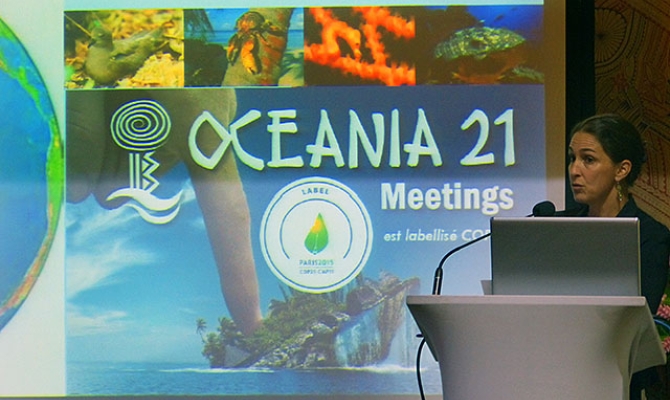
15 May, 2015, Apia, Samoa, PCCR - Across the vast expanse of Oceania, it has been estimated that there are almost 1,400 distinct languages spoken, with approximately 450 found throughout Melanesia, Micronesia and Polynesia, and over 800 in Papua New Guinea alone.
At the recent Oceania 21 summit in New Caledonia, leaders from both sovereign states and autonomous territories of the region came together to speak the language of climate change, a common threat to them all.
"We wish to give a very clear, forceful and ambitious message, on the basis of the commitments we made during the Oceania 21 Summit" said Anne-Claire Goarant, Senior Advisor for multilateral cooperation and regional organisation of the Government of New Caledonia.
"The approach is intended to be inclusive and bring together our challenges and objectives for COP21, which we must influence as soon as possible" said Miss Goarant. Photo: Anne-Claire Goarant presents at the 2015 Pacific Climate Change Roundtable
Photo: Anne-Claire Goarant presents at the 2015 Pacific Climate Change Roundtable
These commitments are outlined in the Lifou Declaration, which was endorsed at Oceania 21. Today this Declaration was submitted to the 2015 Pacific Climate Change Roundtable being held in Apia, Samoa.
The declaration includes alarming statements including: 'we are all the victims of climate change, a reality we cannot deny any longer and which is confirmed by the IPCC reports', and references to the lack of available support such as: 'insufficient funding for mitigation and adaptation policy implementation, insufficient capacity building and transfer of technological advances, weakness of existing measures in terms of loss and damages as well as the lack of inclusion of civil society in climate negotiations'.
The all-encompassing approach taken at Oceania 21 that influenced the declaration included "a bridge between governments and the three pillars representing science, tradition and youth" said Miss Goarant. Of particular importance is the strengthening of links between climate change science and traditional knowledge by working with customary leaders in the Pacific.
"Positive steps were taken at Oceania 21 to link science and action," said Mr. David Sheppard, Director General of SPREP. "A bridge was also formed between the French and English speaking regions in the Pacific".
"The Lifou Declaration is an excellent declaration, as is the Majuro Declaration. What is needed is to bring declarations such as this to action, particularly at COP 21" said Mr. Sheppard.

To access the full Lifou Declaration please visit: www.sprep.org/attachments/VirLib/New_Caledonia/Lifou_Declaration_2015.pdf
The PCCR has been made possible with support from the Government of Switzerland, Government of Samoa, Government of Australia, European Union, GIZ, United Nations Development Program (UNDP), Secretariat of the Pacific Community (SPC), Pacific Islands Forum Secretariat (PIFS), University of the South Pacific (USP) and the Pacific Council of Churches (PCC). Additional funding support was provided by the EU-GIZ Adapting to Climate Change and Sustainable Energy (ACSE) Programme, and Climate Analytics through its High Level Support Mechanism (HLSM) project as well as the United States Agency for International Development (USAID).